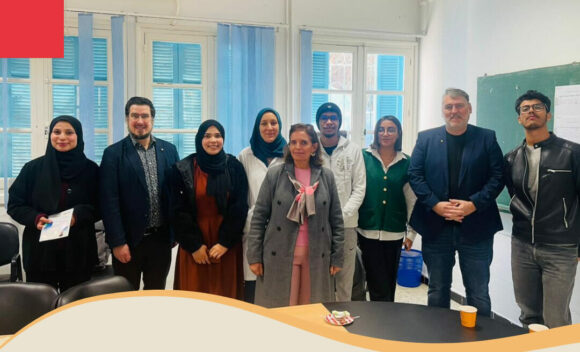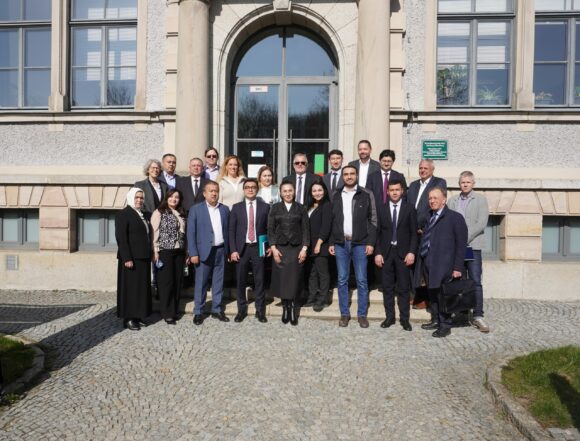From July 10 to 14, 2023, the 3rd International Textile Online Week (ITOW) took place at the Münchberg Campus of Hof University of Applied Sciences. Due to COVID-19, the International Textile Summer School, which has been held regularly since 2014, unfortunately had to be cancelled in 2020. Nevertheless, in order to give as many international prospective students as possible the opportunity to get to know Hof University of Applied Sciences and its textile technology courses, this event has now been offered in an online format since 2021. Already in 2021, the event achieved an exceptionally wide reach with 110 registrations from prospective students from India, Bangladesh, Egypt, Pakistan, Chile, Ethiopia, Iran, Indonesia, Romania, Vietnam, Brazil, Malaysia, Nigeria, Mexico, Peru, the Philippines and Sierra Leone. At this year’s ITOW, the number of participants rose to around 350, tripling since the event’s inception.

Together with Prof. Dr.-Ing. Claus-Ekkehard Koukal, organizer of the event and head of the bachelor program “Innovative Textiles”, the campuls editorial staff looks back on an interesting week around the topic of textiles and textile technology, which was attended by prospective students and representatives from nine nations, namely India, Pakistan, Bangladesh, Indonesia, Myanmar, Kazakhstan, South Africa, Brazil, Germany.

Prof. Koukal, since the Corona pandemic, the face-to-face format of the International Textile Summer has changed to the International Textile Online Week, which took place for the third time this year. What is the event all about? What advantages does the online format offer, especially in this international context?
The online format offers several advantages at once: it allows us to significantly expand the number of participants and interest many more potential students in the topic. At the same time, it was easier for professional participants from industry and research to focus on the presentations that corresponded to their area of interest. In this way, we were able to safely expand the circle of participants and direct their interest to our expertise. It was also easier for the speakers to attend the conference. One of them gave his presentation from his vacation home in Portugal, which would certainly not have been possible at a live event. It also makes the event much more sustainable because participants and speakers did not have to travel from far away.
With around 350 registrations, you have a record number of participants this year. Where did the participants come from and what was their background?
Participants and speakers were registered from Belgium, Bangladesh, Brazil, Ethiopia, Germany, India, Indonesia, Kazakhstan, Myanmar, Pakistan and South Africa. We used our good international contacts and advertised the event at partner universities. However, many registrations also came about through private contacts of individual participants or speakers. Companies with their own presentations also registered participants. Because we offered the event online, it was possible to register without paying a participation fee. This certainly also led to the high number of participants.
What did the participants have to look forward to? What was the program like?
With a mixture of trial lectures, introductions to our textile-related courses of study and presentations by international colleagues, the primary aim was to arouse interest in the subject of textiles and in Hof/Münchberg as a place to study. In particular, pictures from our modern and very well-equipped laboratories were shown, which always arouse enthusiasm among visitors. We wanted to show that studying at our university is very practice-oriented and takes place on state-of-the-art machines.
The aim of the presentations by our industrial partners was to demonstrate that the manufacture of textiles today often relates to very special, technical applications. As a result, they are part of important high-tech products and it is impossible to imagine aircraft, wind turbines, automobiles, medical products, etc. without them. This ensures a professional future for a student in the field of textile technology, and not only in countries where clothing is predominantly produced today.
The speakers at the International Textile Online Week came from Hof University of Applied Sciences as well as from national and international university environments, such as TU Dresden or Ghent University, but also partners from industry participated in the event as experts and lecturers. In addition to a presentation of the bachelor’s degree program “Innovative Textiles”, which is taught in English at the Münchberg campus and has a very international focus, you also participated in the event with three other topics. What were your presentations about?
As head of the nonwovens division, I naturally gave a basic insight into the production of nonwovens and our mostly state-of-the-art laboratories. While woven and knitted fabrics are produced globally, this highly efficient textile production technology is not yet so widespread everywhere – also because of the high initial investment. In a second lecture, I presented so-called smart textiles. These involve the integration of new capabilities into a textile, often on the basis of semiconductors integrated into the textile. One example is a firefighter’s jacket that monitors the vital functions of the person wearing it, communicates possible hazards to the control center, simultaneously detects dangerous external conditions and warns of risks, and still provides all the protective functions expected of more modern firefighter protective clothing. With this and also with the third presentation on the rubber coating of textiles – especially for the area of flexible transitions in public transport – I wanted to show the complexity in the development of technical textiles. The aim was to show future engineers how challenging and forward-looking this work is, and that it is fun and meaningful to take on such tasks.

Looking back on the 3rd International Textile Online Week: Which topics were predominant?
Clearly the topic of sustainability. In industry and research, this topic has become very important today. On the one hand, because national legislators demand it – by the way, by no means only in Europe – but also because of the participants’ own insight. The realization of the need for a change away from the wasteful use of resources is gradually gaining global acceptance. Last but not least, sustainability and, for example, higher recycling rates, lower energy requirements or the use of production waste for other products can be economically lucrative. Ecology and economy do not necessarily have to contradict each other.
Thank you very much for the interview.
Voices from the 3rd ITOW
From our point of view, the value of our cooperation with the Münchberg campus of Hof University of Applied Sciences clearly lies in the mutual, trusting exchange about new developments in the field of textile chemistry and the training of talented, well-educated junior staff by Hof University of Applied Sciences, who are already getting to know CHT and its career opportunities as part of internships or when supervising bachelor’s and master’s theses.”
Susanne Ehret, CHT Group
I really enjoyed studying at the Münchberg campus. It offers many opportunities to get to know the different areas of the textile industry. What is special about studying in Münchberg is the good contact with the lecturers and the international students. I wrote my master’s thesis at Kelheim Fibres, where I have been a project manager in the New Business Development department since I graduated. I particularly like the fact that my employer is a totally innovative and future-oriented company and that here I can continue to work on the topic of my master’s thesis, the development of sustainable menstrual underpants, and in doing so meet partners from different areas of the textile industry. It was very nice to present this project at ITOW 2023 and give students an insight into possible career fields after studying in Münchberg.”
Natalie Wunder, graduate of the master’s program “Sustainable Textiles”
and speaker at ITOW 2023
Sincere thanks also go to the external speakers who made the 3rd ITOW such a great success:
- Dr. Dietrich Wienke, (DSM) Dyneema
- Dr. Lars Hahn, TU Dresden
- Geert de Clercq, Ghent University
- Sylvia Happel, Lenzing AG
- Michael Osterrieder, Rudolf Chemistry
- Yash Jagwani, CHT Group
- Natalie Wunder, Kelheim Fibres
- Christian Lott, DMIx
- Sophie Neff, KM.ON GmbH
- T. Mende, Thies Textile Machinery
- Biruk Ketema Semu, Ethiopian Institute of Textile and Fashion Technology, Bahir Dar University
- Dr. Heike Illing Günther, STFI







